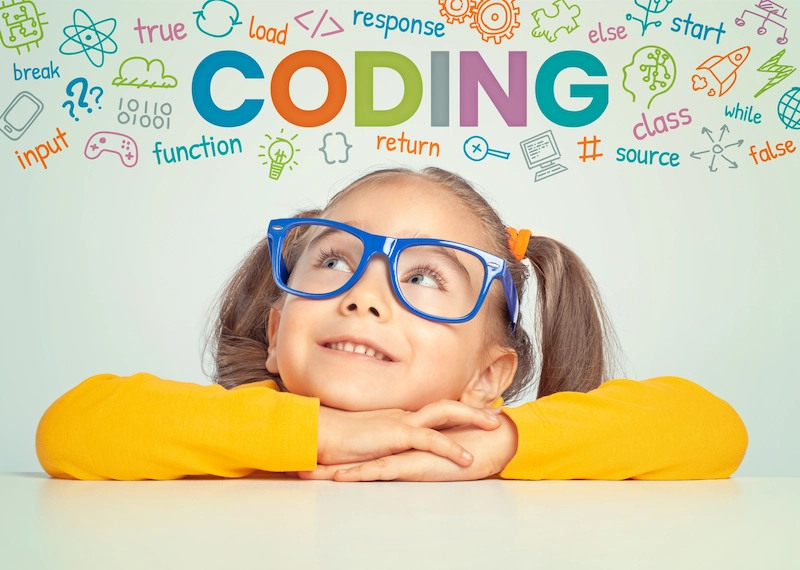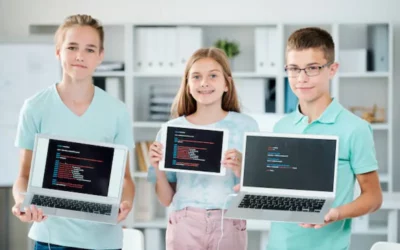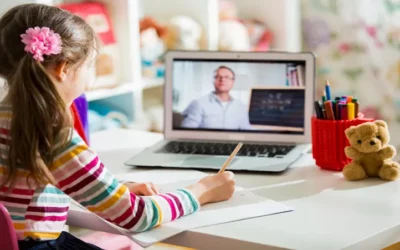We cordially invite you to embark on an enriching coding journey, where creativity knows no bounds and the realm of mini-game development awaits your exploration. With a focus on formal yet engaging discourse, we endeavor to unravel the intricacies of programming, empowering you to craft captivating and entertaining games of your own.
Table of contents
- Introduction
- Computer Science – The Gateway to Endless Opportunities
- Game Ideas – Let Your Imagination Soar
- Tynker Community – Your Supportive Game Development Hub
- Coding Challenge – Level Up Your Skills
- Game Development – A Journey of Learning and Fun
- Unlocking the Power of Tynker Activity Book and Game Kits
- Cool Community Games and Tynker Minigame Makers
- Minecraft Project Ideas and Beyond
- Code Your Own Games with Tynker’s Block Code
- Coding Courses for Kids – Learning Made Fun
- Conclusion
- Frequently Asked Questions (FAQ’S)
Introduction
It’ll be hard for everyone to learn how to code, but the keys to developing habits of perseverance and curiosity are a growth mindset and entertainment.
Whether you’re a seasoned programmer or a beginner looking to dip your toes into the world of coding, building mini games can be a fascinating and rewarding experience.
Likewise, in today’s technology-driven world, computer science has become an essential skill, and one of the most enjoyable ways to learn it is by creating mini games with code.
In this blog, we’ll explore how you can dive into the world of mini game development, Importance of computer science, coding for kids, and tapping into the vast possibilities offered by the Tynker Community.
So, let’s embark on this exciting journey and unleash your creativity!

Computer Science – The Gateway to Endless Opportunities
The beauty of computer science lies in its versatility. Whether you’re passionate about art, music, medicine, finance, or any other domain, computer science can enhance and augment your field of interest. For artists, it opens doors to digital art, animation, and virtual reality experiences.
1. A World of Possibilities
Computer science forms the backbone of modern technology, and learning to code opens doors to a plethora of opportunities. It’s not just about creating software;
Computer science, the heartbeat of modern technology, holds the key to a world of boundless possibilities. In this era, leastwise we must teach computer basics for kids .
Game Ideas – Let Your Imagination Soar
A key aspect of building mini games is brainstorming exciting game ideas. You can let your imagination run wild and create games that encompass various genres – from simple puzzles to action-packed adventures.
Start small, seek inspiration, and join the game development community to turn your ideas into unforgettable games.
Tynker Community – Your Supportive Game Development Hub
When it comes to creating mini games with code, the Tynker Community is an invaluable resource. Tynker provides a user-friendly platform with visual programming tools that make game development accessible to all, including kids and beginners.
With a supportive community of like-minded individuals, you’ll have ample opportunities to share ideas, get feedback, and collaborate on exciting projects.
Coding Challenge – Level Up Your Skills
Challenges are a fantastic way to grow as a programmer and game developer. Tackling coding challenges related to mini games will sharpen your coding skills and push you to think outside the box. Embrace these challenges as steppingstones to becoming a more proficient game developer. Level up your skills by programming games for kids, an exciting and educational way to learn coding.
Navigate the world of coding with confidence through CodeCHAMPS and our captivating focus on boolean logic. Our innovative programs empower young learners to grasp the fundamental principles of logic and decision-making in programming.
Game Development – A Journey of Learning and Fun
Game development is not just about coding; it’s a holistic journey that incorporates design, storytelling, and user experience.
As a game developer, you have the power to bring your imagination to life, crafting immersive experiences and sharing them with a supportive community.

1. Unleashing Your Creativity
Game development is an art form that allows you to unleash your creativity like never before. From crafting captivating storylines to designing visually stunning environments, every aspect of game development is an opportunity to express yourself.
Your creativity is the only thing limiting what you can create, whether it be an intense shooter or a thought-provoking puzzle game.
2. Learning through Challenges
As you embark on your game development journey, you’ll encounter numerous challenges, both big and small. From technical hurdles to design dilemmas, each obstacle presents a chance to learn and grow.
Problem-solving becomes second nature, and you’ll find yourself exploring different solutions to make your game better. Embrace these challenges, for they are steppingstones to becoming a more skilled and capable game developer. Problem-solving becomes enjoyable and interactive as kids learn to code games. Check out code games for kids.
In fact, it’s not just about entertainment; it’s a rewarding pursuit that thrives on learning, collaboration, and the sheer delight of crafting interactive experiences.
Unlocking the Power of Tynker Activity Book and Game Kits
The Tynker platform offers a wealth of resources to guide you through your mini game development journey. The Tynker Activity Book is an excellent starting point, providing step-by-step guidance and engaging activities to get you started with coding. Tynker offers some of the best coding games for kids, providing an engaging and educational coding experience.
Game kits, on the other hand, are pre-built templates that you can customize and modify, enabling you to understand game mechanics and develop your unique creations.
Cool Community Games and Tynker Minigame Makers
Within the Tynker Community, you’ll find an array of cool community games that serve as inspiration for your projects.
Moreover, the Tynker Minigame Makers, a community of passionate developers, will support you throughout your coding endeavors. Collaboration and sharing knowledge are vital aspects of the Tynker experience.

Minecraft Project Ideas and Beyond
For those with a love for Minecraft, Tynker offers Minecraft Project Ideas to combine the excitement of the game with the creativity of coding. You can create your own mods, develop custom gameplay mechanics, and let your imagination run wild in the blocky universe of Minecraft.
Code Your Own Games with Tynker’s Block Code
Tynker’s Block Code is designed to simplify coding for beginners. With drag-and-drop blocks, you can effortlessly piece together code and witness your mini games come to life.
The intuitive nature of block coding eliminates the intimidation that may come with traditional programming languages, making it perfect for aspiring young game developers.
Coding Courses for Kids – Learning Made Fun
If you’re a young, aspiring game developer or a parent looking to nurture your child’s creativity, coding courses for kids offer an exciting and engaging learning environment. These courses provide a structured curriculum that teaches coding concepts through hands-on game development projects, making learning both enjoyable and effective. Coding lessons for kids provide a fun and educational way to introduce them to the world of programming.
1. Skills for Tomorrow’s World
In an increasingly technology-driven society, coding is a skill that prepares kids for the future. Whether they pursue careers in programming or other fields, the problem-solving and analytical skills gained from coding courses will benefit them in various aspects of life.
In addition, coding courses for kids have become a popular way to introduce young minds to the world of technology. Through coding games for kids and interactive activities, kids learn to code with joy and curiosity. These courses empower future innovators, teach problem-solving, and use visual programming to make coding accessible.

2. Empowering Future Creators and Innovators
Coding courses for kids not only impart coding skills but also foster essential attributes like problem-solving, logical thinking, and creativity. By encouraging children to think critically and find solutions to challenges, these courses lay the foundation for future innovators and tech-savvy individuals.
Furthermore, kids develop crucial skills for tomorrow’s world by creating real projects and fostering a supportive community. Parents’ involvement further enhances their learning journey. With coding courses for kids, learning becomes an enjoyable adventure that lays the foundation for a technologically adept future. Online coding classes for kids encourage active parents’ involvement, fostering a collaborative learning experience.
Conclusion
The bottom line is, building mini games with code is an enriching experience that combines creativity, problem-solving, and the thrill of seeing your creations come alive. The Tynker Community serves as an excellent platform to kickstart your journey into game development, connecting you with fellow enthusiasts and providing the necessary resources to succeed.
So, dive in, explore your passion for coding, and unleash your creativity through the magic of mini game development! At an early age using platforms like Brightchamps, you can empower the next generation to become active creators and innovators, shaping the future with their skills and ideas.
BrightChamps also offers robotics for kids with top instructors who also provide an enriching learning environment.
Explore the enlightening and informative articles on the BrightChamps blog page, your gateway to valuable insights, tips, and resources for nurturing children’s education, growth, and well-being.
Frequently Asked Questions (FAQ’S)
Mini games are small, self-contained games that offer quick bursts of entertainment. Coding your own mini games can be a fun and rewarding experience. It allows you to unleash your creativity, learn essential coding skills, and share your creations with friends and family.
Not at all! Mini game development can be accessible to everyone, regardless of their coding experience. There are user-friendly platforms like Tynker that use block-based coding, making it easy for beginners, including kids, to get started.
While various programming languages can be used, for beginners, block-based coding languages like Scratch or Tynker are highly recommended. As you progress, you may explore languages like Python or JavaScript, which offer more flexibility and power.
Mini game development challenges you to think logically, use conditional statements, implement loops, and understand game mechanics. These skills are transferable to other coding projects and can significantly improve your problem-solving abilities.
Absolutely! Collaboration can enhance the game development experience. You can work with friends, family, or join online coding communities where you’ll find like-minded individuals ready to share ideas, provide feedback, and collaborate on exciting projects.
There are plenty of resources available! Online platforms like Tynker offer tutorials, coding courses, and activity books to guide you through the process. You can also find coding forums, YouTube tutorials, and blogs dedicated to mini game development.
Yes! Mini game development skills can translate to various fields. Understanding game mechanics and user experience can be useful in designing interactive applications, educational software, and even simulation tools.
Once you’ve created your mini games, you can share them with friends and family by sending them the game file or sharing a link to play online. Online coding communities and game development platforms also provide spaces to showcase your creations.
Absolutely! Mini game development can be an excellent starting point to build foundational skills. As you become more confident in your abilities, you can gradually progress to more complex and ambitious game projects.
Mini game development knows no age limit! It’s a fun and engaging activity for kids and adults alike. Whether you’re a parent looking to bond with your child through coding or an adult exploring a new hobby, mini game development offers something for everyone.


 We are an army of educators and passionate learners from BrightChamps family, committed to providing free learning resources to kids, parents & students.
We are an army of educators and passionate learners from BrightChamps family, committed to providing free learning resources to kids, parents & students.








